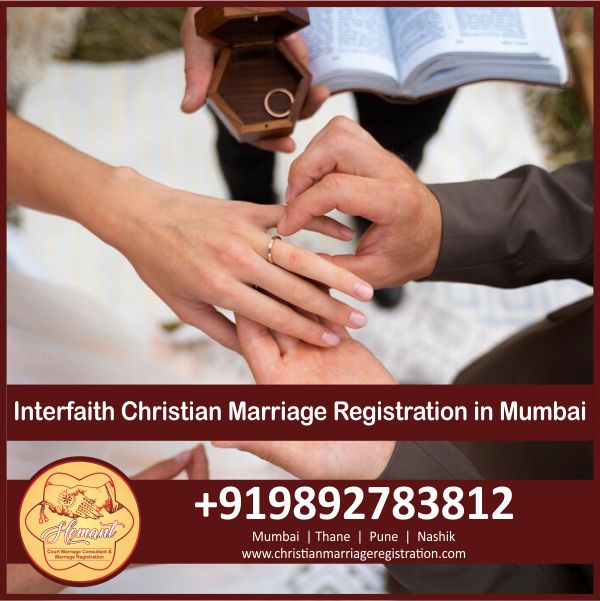Interfaith Christian marriages involve a union between individuals from different religious backgrounds, often presenting unique challenges both legally and socially. In Mumbai, such marriages can be facilitated through various legal frameworks, ensuring that couples receive the necessary legal recognition and protection under Indian law. The importance of legal registration cannot be overstated, as it provides couples with essential rights and protections in matters such as property, inheritance, and social benefits.
Legal registration of an interfaith Christian marriage in Mumbai is crucial for several reasons. It serves as proof of marriage, which is necessary for administrative tasks like passport name changes and visa applications. Moreover, it establishes legal rights in property and inheritance matters, protecting both partners’ interests. Hemant Enterprises, with its extensive experience in handling interfaith marriages, ensures a smooth and stress-free process by providing comprehensive legal guidance and end-to-end documentation support.
Understanding Interfaith Christian Marriage
Interfaith Christian marriages combine elements of Christianity with another religion, often involving complex legal and social considerations.
- Definition of Interfaith Christian Marriage: This refers to a marriage between a Christian and a non-Christian, where both partners may choose to maintain their respective faiths or opt for a civil marriage.
- Religious & Civil Perspectives: From a religious standpoint, interfaith marriages may require special considerations, such as obtaining permission from religious authorities or performing ceremonies that respect both faiths. Civilly, these marriages are governed by laws like the Special Marriage Act, 1954, which allows for a secular marriage without requiring religious conversion.
- Common Concerns for Couples & Families: Common concerns include religious and social acceptance, legal implications of conversion (if applicable), and potential parental objections. However, under Indian law, particularly Article 21 of the Constitution, individuals have the right to marry by choice, providing legal protections against undue interference.
Laws Governing Interfaith Christian Marriages
Interfaith Christian marriages in India are governed by several laws, each applicable depending on the specific circumstances of the marriage:
- Indian Christian Marriage Act, 1872: Applies to marriages performed in churches where at least one partner is Christian.
- Special Marriage Act, 1954: Governs civil marriages without requiring religious conversion, making it suitable for interfaith couples. This act requires a 30-day notice period at the marriage registrar’s office.
- Hindu Marriage Act, 1955: If one partner is Hindu and chooses to follow Hindu rites, this act applies.
- Muslim Personal Law & The Nikah Process: Relevant if one partner is Muslim.
- Foreign Marriage Act, 1969: Applies to NRIs or foreign nationals.
- High Court & Supreme Court Judgments: These provide additional legal guidance and protections for interfaith couples, ensuring their rights are upheld under the Constitution.
For more information on Indian marriage laws, you can visit the Ministry of Law and Justice website.
Why Church Marriage Needs Legal Registration?
Many couples assume that a church wedding itself is legally valid, but this is not true. In India, there is a distinction between religious marriage and legal marriage.
- Religious Marriage vs. Legal Marriage: A church wedding is a religious ceremony, but it does not automatically confer legal status. Legal registration under the Indian Christian Marriage Act or the Special Marriage Act is necessary for legal recognition.
- Benefits of Registration: Legal registration provides numerous benefits, including legal protection, property rights, spousal benefits, and streamlined visa processing.
Governing Laws for Christian Marriage Registration
Christian marriages in India are governed by specific laws:
Indian Christian Marriage Act, 1872
Applies to marriages where at least one partner is Christian. This act stipulates that the marriage must be solemnized by a licensed clergy member or a Marriage Registrar.
Special Marriage Act, 1954
Applies to interfaith marriages, including those involving a Christian partner. This act requires a 30-day notice period at the marriage registrar’s office.
Legal Validity of Church Marriage Certificate
While a church-issued marriage certificate is important, it is not sufficient for legal recognition. Couples must register their marriage with the Marriage Registrar to obtain a legally valid marriage certificate.
Registration of Interfaith Church Marriages in Mumbai
For interfaith marriages involving a Christian partner, the Special Marriage Act, 1954 applies:
- Process Under the Special Marriage Act, 1954: Requires a 30-day notice period at the marriage registrar’s office.
- Additional Paperwork Required: Includes a declaration of intent to marry and proof of age and identity.
- How Long Does the Process Take? Typically takes about 30 days after the notice period.
Challenges & Legal Solutions in Interfaith Marriages
Interfaith marriages often face several challenges, but there are legal solutions available:
- Religious & Social Acceptance: Legal rights of interfaith couples are protected under the Constitution, ensuring they are not discriminated against.
- Conversion & Legal Implications: Conversion is not mandatory unless required by personal religious laws.
- Parental Objections & Legal Protections: Under Article 21 of the Constitution, individuals have the right to marry by choice, providing legal protections against undue interference.
- Marriage Validity Under Indian Law: The Prevention of Forced Conversions Act ensures that conversions are voluntary.
- Legal Remedies Against Marriage Obstruction: Couples can seek court protection if their marriage is obstructed.
Common Myths & Facts About Interfaith Christian Marriages
Here are some common myths and facts about interfaith Christian marriages:
- Myth: Interfaith marriages require conversion.
- Fact: Conversion is not mandatory unless required by personal religious laws.
- Myth: Special Marriage Act takes too long.
- Fact: With proper documentation, the process can be completed in 30 days.
- Myth: Churches will not solemnize interfaith marriages.
- Fact: Many progressive churches do solemnize interfaith weddings.
Get Your Marriage Registered Today!
Fill the below form for enquiry.
Step-by-Step Process for Interfaith Christian Marriage Registration
The registration process for an interfaith Christian marriage involves several key steps:

Filing a Notice of Intended Marriage
Under the Special Marriage Act, couples must file a notice at the marriage registrar’s office, which includes a 30-day waiting period.

Document Verification & Witness Selection
Couples must submit required documents and select two witnesses who will attest to the marriage.

Marriage Solemnization Options
The marriage can be solemnized in a church, court, or through a civil ceremony.

Issuance of a Legal Marriage Certificate
After solemnization, a legal marriage certificate is issued, providing official proof of marriage.
Required Documents for Interfaith Christian Marriage
To register an interfaith Christian marriage, couples need to submit the following documents:

Birth Certificates or Age Proof

Baptism Certificate

Residence Proof of Both Partners

Passport-Sized Photographs

Wedding Invitation Card

Affidavit Confirming Marital Status
Special Circumstances Documentation:
- Previous marriage: Divorce decree or death certificate of former spouse
- Foreign nationals: Valid visas, residence permits, or apostilled documents
- Age verification: Birth certificates or school leaving certificates (if required)
Why Choose Hemant Enterprises?
With over sixteen years of specialized experience in marriage registration services, Hemant Enterprises brings unparalleled expertise to Christian couples seeking marriage registration in Mumbai. Their deep understanding of the Indian Christian Marriage Act and its application within local jurisdictions ensures accurate compliance with all legal requirements. This expertise translates into efficient handling of documentation, anticipation of potential issues, and smooth navigation through administrative processes that might otherwise prove challenging for couples unfamiliar with legal procedures.
The company prioritizes processing efficiency without compromising legal accuracy, employing streamlined workflows that minimize bureaucratic delays while maintaining full compliance with marriage registration regulations. Their established relationships with registration authorities facilitate smoother communication and processing, significantly reducing the time couples must wait for certificate issuance. This balance of speed and accuracy proves particularly valuable for couples facing time-sensitive situations such as visa applications or name change requirements.
EXCELLENTTrustindex verifies that the original source of the review is Google. Very good service. I stay outside India and had a short while in Mumbai in which I needed the process completed. Hemantji ensured a quick and seamless process as his team took the lead, sorting out all the requirements. He is also quite prompt with his replies to any queries. Would recommend.Trustindex verifies that the original source of the review is Google. It was a good experience. The agent was very good in communication and reverted all our queries. We asked the agent to visit our place for the formalities where he made all the procedures smooth and quick.Trustindex verifies that the original source of the review is Google. "I am truly impressed with your exceptional service! Your speed and efficiency in handling everything, from the arrangements to the instant certification, made the entire process seamless and stress-free. Your professionalism and dedication are remarkable, and I sincerely appreciate your outstanding work. Thank you for making everything so quick and effortless!"Trustindex verifies that the original source of the review is Google. He is so much cooperative and cost is very reasonable for anyone.Trustindex verifies that the original source of the review is Google. HEMANT JI HELPED US A LOT . IT WAS HASSEL FREE , WORK AND REGISTRATION COMPLETED IN LESS THAN 30 MINS. THANK YOU 😊Trustindex verifies that the original source of the review is Google. The whole process was very seamless and hassle free. Hemant was very helpful throughout the process. Would recommend Hemant for any Marriage registration related servicesTrustindex verifies that the original source of the review is Google. We recently registered our marriage in Mumbai with the help of Mr. Hemant. He gave a lot of clarity with respect to the process and was very responsive. The entire process was seamless and I would definitely recommend him.Trustindex verifies that the original source of the review is Google. Very good services and on time. Whole process for registration was conducted very smoothly.👍🏼
Trusted by over 10000 Clients in all over Maharashtra and India. Since 2006.
- 16+ Years of Experience
- Expert Legal Guidance
- Multiple Branches
- Hassle-Free Document Processing
Frequently Asked Questions.
Court marriage is not necessary but is often preferred for legal simplicity.
Couples can opt for a civil marriage under the Special Marriage Act.
Yes, couples can have both, but the civil marriage provides legal recognition.
Under Article 21 of the Constitution, individuals have the right to marry by choice.
The Special Marriage Act typically takes 30 days with proper documentation.
Get Your Marriage Registered Today!
Fill the below form for enquiry.








